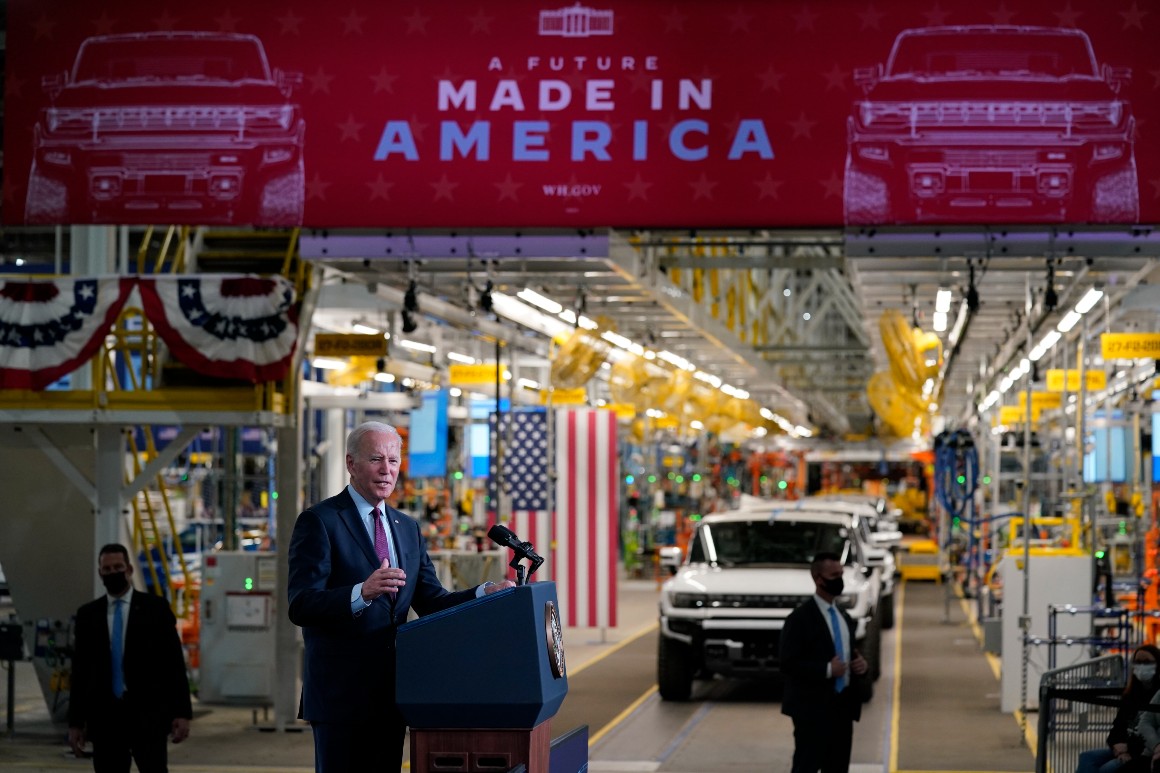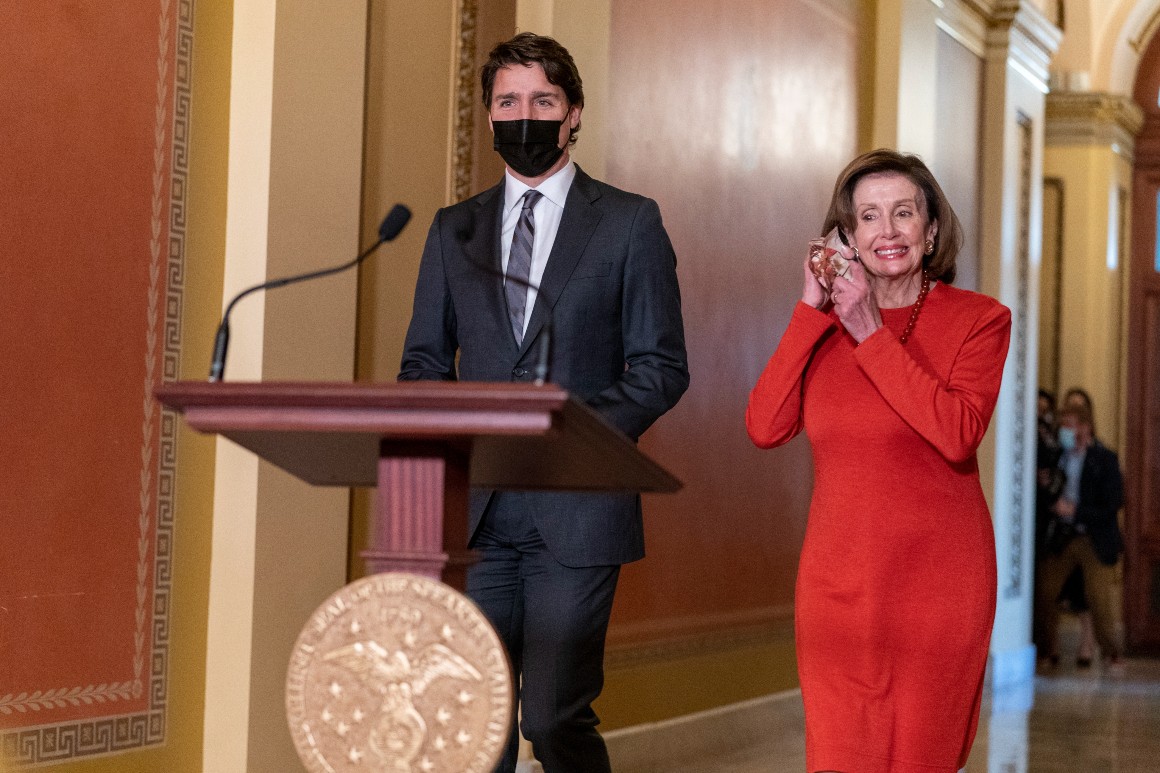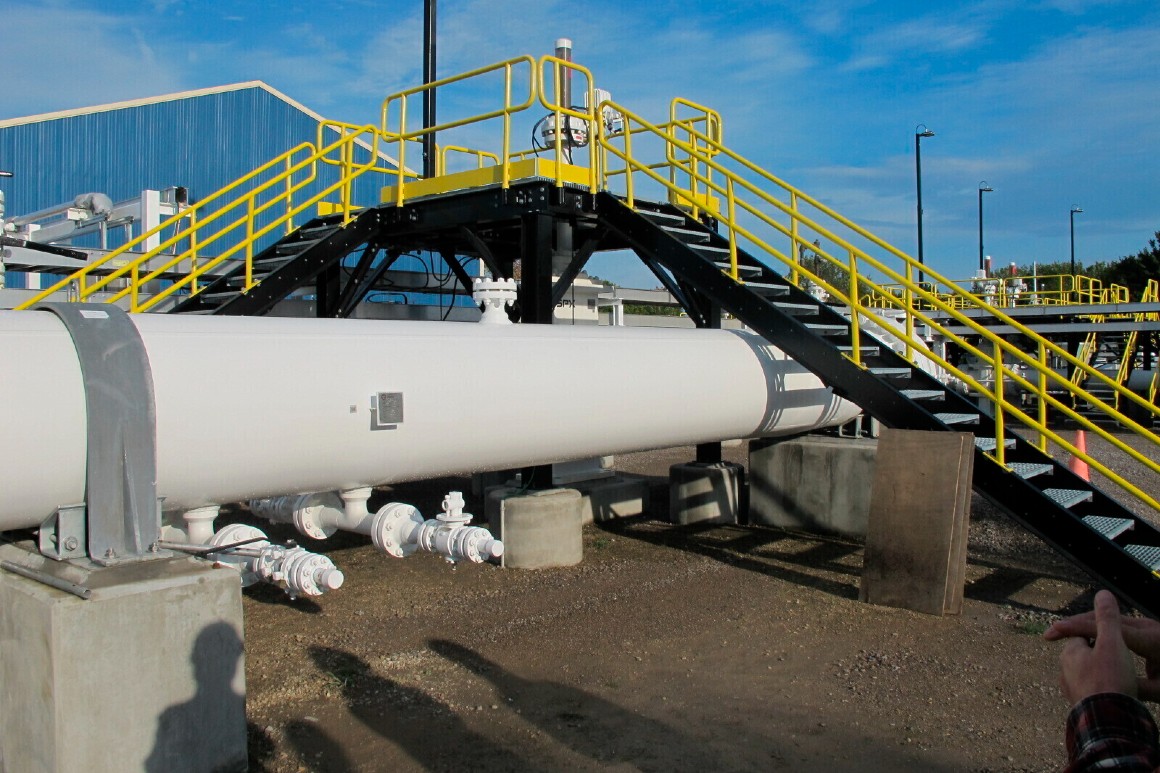
President Joe Biden hopes to rebuild strained ties as he gathers with the leaders of Canada and Mexico at a White House on Thursday, but his biggest obstacle may be his own domestic economic and political agenda.
Biden has a lot riding on the meeting with Canadian Prime Minister Justin Trudeau and Mexican President Andrés Manuel López Obrador. It is intended to take stock of progress under the U.S.-Mexico-Canada agreement, the pact signed in early 2020 to update NAFTA. And it’s the first “Three Amigos” meeting since 2016, after former President Donald Trump disbanded the annual practice.
The leaders are expected to announce agreements to ease the supply chain crunch, speed vaccine distribution to countries in the region and curtail methane emissions that worsen climate change, a senior White House official said.
But trade leaders in all three nations say Biden’s policies to rebuild American manufacturing risk alienating the continental neighbors and derailing the regional cooperation.
Even before the meetings begin, Trudeau has teed up economic tensions as a main focus of the week. One major concern involves Biden’s tax-credit proposal for union-made electric vehicles, one of scores of incentives for U.S.-made goods and materials in the Democrats’ pending reconciliation bill.

Trudeau warned Wednesday that the plan would have a “real negative impact.”
He plans conversations with U.S. leaders “to make sure that people understand that doing this together is good for all of us, good for the jobs, good for the future as we fight climate change as we build prosperity in North America,” Trudeau said during a panel appearance hosted by the Wilson Center in Washington, D.C.
The Biden administration official, who spoke anonymously to preview the meeting, said the electric vehicle dispute will likely be discussed at the summit but didn’t indicate whether a resolution was expected.
The conflict between Biden’s agenda and allies forces the president to choose between regional economic cooperation and his signature policies to deliver more manufacturing jobs to Americans.
Failure to yield to Canada and Mexico could mean retaliation under the USMCA, including tariffs or other trade restrictions on American goods. And it could make the North American neighbors wary about cooperating on issues like immigration or joining Biden’s global campaign to isolate China economically.
“The U.S. is pursuing what could be seen as an inward-looking industrial program,” said Kenneth Smith Ramos, chief NAFTA negotiator under former Mexican President Enrique Peña Nieto. “Obviously, Mexico is concerned about some of the policies the U.S. may implement on Buy American [rules] or tax credits aimed at U.S. companies on electric vehicles, which could distort the market.”
Even as Biden put trade on the back burner in his first year, he moved to boost domestic manufacturing — often at the expense of Canada and Mexico.
Already, he’s strengthened Buy America provisions for federal contracts by executive order and in the bipartisan infrastructure law, signed on Monday, which has sparked Ottawa’s ire. His team has also intervened in Mexican union elections, in part to make wages more competitive with U.S. workers. And the White House has backed American-friendly rules for cars under the USMCA.
The domestic manufacturing push continues in Congress, where Biden’s seeking a litany of domestic manufacturing provisions in the Democrats’ reconciliation package, including tax credits for union-made electric vehicles and incentives for wind and solar companies to use American materials.
Such protectionist provisions “often start in Congress,” said Bill Reinsch, former undersecretary of Commerce for export administration in the Clinton administration. “The difference this time is the administration appears to be supporting it. Previous administrations — other than Trump — either opposed these kinds of things or, if they didn’t oppose them publicly, just tried to make them go away.”
Canada has already slammed the stronger made-in-America rules and said it believes the electric-vehicle credits violate the USMCA. And those are far from the only cross-border concerns since Biden’s arrival.
Biden and Trudeau were on different sides of the Keystone XL pipeline project’s cancellation. The neighbors have also been at odds over Enbridge’s Line 5 oil pipeline, which is at the heart of a legal dispute between the company and the state of Michigan, one of the critical swing states that Biden visited Wednesday and will need for reelection.
Biden’s team has also not settled long-standing trade disputes over Canadian lumber or dairy, even as he’s smoothed over tensions with the European Union over steel and aircraft subsidies. And the governments’ steps to lift Covid-19 restrictions at the border have moved at different speeds as well, which critics point to as evidence the two leaders are out of sync.
“The president appears to be making decisions based on the domestic political impact of the decisions as opposed to what is in the strategic best interest of our two countries,” Perrin Beatty, president of the Canadian Chamber of Commerce, said in an interview. “The challenge for the prime minister in going to Washington is, 'How do we rebuild that strategic partnership?'”

Canada is threatening action under the USMCA over the auto rules. Canada’s Industry Minister François-Philippe Champagne called for the removal of “uncertainty caused by divergent policies” in the automotive industry like the electric vehicle tax credits when he met with Commerce Secretary Gina Raimondo earlier this month.
Mexico’s domestic actions have raised trade concerns as well, particularly a pending energy market reform that Washington says would violate the North American trade pact by curtailing private investment in favor of the state-backed firm Pemex.
U.S. Ambassador to Mexico Ken Salazar raised “serious concerns” with the law earlier this month, but Smith Ramos said the Americans have so far been “cautious” in dealing with the bill and are “waiting to see” if it will pass in Mexico’s Congress.
Spiraling trade disputes under USMCA are the main risk if the leaders cannot begin to mend their relationships this week. Mexico has already called for talks under the deal about automotive rules of origin, which make it more difficult for Mexican plants to comply. It could escalate those concerns to a dispute settlement panel if they are not addressed, potentially resulting in tariffs or trade restrictions.
The U.S. could also up the ante by pushing further USMCA action on agricultural market access in Mexico and Canada, where Washington, D.C., says the governments are limiting access for American crops.
“The U.S. has not put its foot down on issues having to do with agricultural market access, or so far, any actions regarding the efforts to have energy counter-reforms in Mexico,” Smith Ramos said. “Hopefully it all gets resolved otherwise you will have a pile of irritants in energy, agriculture and automotive that can cause trouble in the region.”
And there’s an added risk for Biden. If he cannot mend those disagreements starting this week, they could have long-lasting consequences for his cooperation with López Obrador to manage the flow of Central American migrants through Mexico and into the U.S.
A separate Biden administration official said the leaders are expected to discuss how to combat the “root causes” of immigration, like economic insecurity in Central America, but there will not be “a real focus, this time around, on our borders.”
Trying to enlist Canada and Mexico in efforts to combat China’s economic rise presents another pitfall. Trudeau on Wednesday teed up the China issue, saying that “not even the United States” can take on Beijing alone, and that “when we work together, as Western democracies, we get things done.” But that cooperation, as any, is contingent on friendly relations between the countries.
“It's very hard to bring other countries into some sort of joint project, particularly focused on China, when you’re sticking it to them somewhere else,” Reinsch said.
----------------------------------------
By: Gavin Bade and Andy Blatchford
Title: Biden’s made-in-America push raises trade tensions at meeting with Canada, Mexico
Sourced From: www.politico.com/news/2021/11/18/joe-biden-made-in-america-tensions-canada-mexico-522868
Published Date: Thu, 18 Nov 2021 05:01:16 EST






